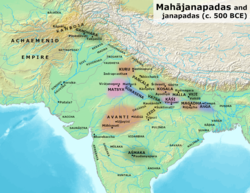Kingdoms of ancient India
| Mahajanapada | ||||||||||||
|
||||||||||||
|
Map of the 16 Mahajanapada
|
||||||||||||
| Capital | Not specified | |||||||||||
| Languages | Sanskrit | |||||||||||
| Religion |
Vedic Hinduism Śramaṇa (Buddhism and Jainism) |
|||||||||||
| Government |
Republics Monarchies |
|||||||||||
| Historical era | Iron Age | |||||||||||
| • | Established | c. 600 BCE | ||||||||||
| • | Disestablished | c. 300 BCE | ||||||||||
|
||||||||||||
A Mahājanapada (Sanskrit महाजनपद) (literally "great realm", from maha, "great", and janapada "foothold of a tribe", "country") is one of the sixteen kingdoms or oligarchic republics that existed in ancient India from the sixth centuries BCE to fourth centuries BCE. Two of them were most probably 'ganas' i.e. republics, and others had forms of monarchy. Ancient Buddhist texts like the Anguttara Nikaya make frequent reference to sixteen great kingdoms and republics which had evolved and flourished in a belt stretching from Gandhara in the northwest to Anga in the eastern part of the Indian subcontinent and included parts of the trans-Vindhyan region, prior to the rise of Buddhism in India.
The 6th century BCE is often regarded as a major turning point in early Indian history. Archaeologically, this period corresponds in part to the Northern Black Polished Ware culture.
The term "Janapada" literally means the foothold of a tribe. The fact that Janapada is derived from Jana points to an early stage of land-taking by the Jana tribe for a settled way of life. This process of first settlement on land had completed its final stage prior to the times of the Buddha and Pāṇini. The Pre-Buddhist north-west region of the Indian sub-continent was divided into several Janapadas demarcated from each other by boundaries. In Pāṇini's "Ashtadhyayi", Janapada stands for country and Janapadin for its citizenry. Each of these Janapadas was named after the Kshatriya tribe (or the Kshatriya Jana) who had settled therein. Buddhist and other texts only incidentally refer to sixteen great nations (Solasa Mahajanapadas) which were in existence before the time of the Buddha. They do not give any connected history except in the case of Magadha. The Buddhist Anguttara Nikaya, at several places, gives a list of sixteen great nations:
...
Wikipedia

